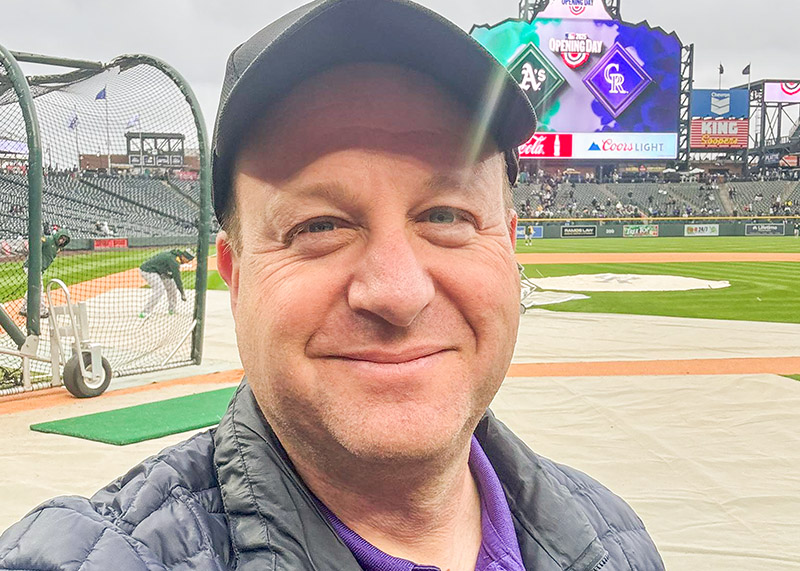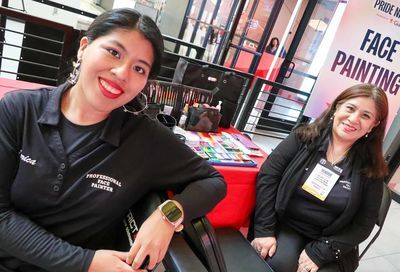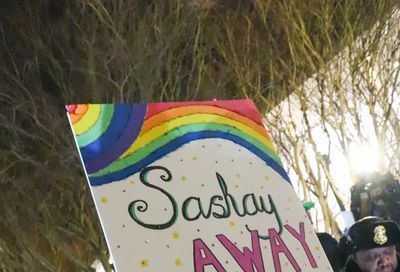LGBTQ People, Allies Lament Supreme Court’s Pro-Discrimination Ruling
Many condemn court's decision finding website designer entitled to "free speech" exemption allowing her to flout nondiscrimination laws.

LGBTQ advocates and allies are lamenting the Supreme Court’s recent decision in favor of a website designer who sought an exemption from her state’s nondiscrimination law to allow her to refuse to create wedding websites for same-sex couples.
Despite one of the alleged requests for service from a gay couple allegedly being fabricated or submitted under false pretenses, as reported by The New Republic, the high court ultimately decided in favor of Lorie Smith, the owner of 303 Creative, LLC, finding that Colorado’s law infringes on her free speech rights.
The court further found that, because Smith creates “custom” websites that contain “expressive content,” she should have been granted a “free speech” exemption to the Coloraod Anti-Discrimination Act allowing her to not only refuse service to same-sex couples, but to post a notice that she will refuse to create websites celebrating same-sex marriages.
Many allies of the LGBTQ community noted that while the decision is not as broad as to overturn nullify laws prohibiting LGBTQ discrimination, it does create a massive carve-out for businesses providing “custom-made” goods or services, allowing them to discriminate against prospective customers — in this particular case, LGBTQ individuals, but potentially members of other groups in the future — on free speech grounds.
“The Supreme Court just gave businesses a license to discriminate,” Ben Olinsky, the senior vice president of Structural Reform and Governance at the left-leaning Center for American Progress, said in a statement. “A claim of free speech cannot be used as an excuse to undermine laws that prevent discrimination in public accommodations. This ruling opens the door for businesses to use artistic freedom as an excuse to discriminate against other historically disadvantaged groups.”
“In America, everyone should have equal access to goods or services, regardless of who they love, who they are, how they worship, or what they look like. Our longstanding civil rights laws promise these protections,” Rachel Laser, the president and CEO of Americans United for Separation of Church and State, said in a statement. “But Christian Nationalists and their judicial allies are trying to drag this country back to the days when marginalized communities were forced to go door to door to find a business that didn’t display signs barring their presence like ‘No Jews, No Blacks, No Irish.’
“Decades ago we as a society agreed that when a business decides to open its doors to the public, it must be open to all. This court negates these protections. Today, it allows religiously motivated discrimination against our LGBTQ family and friends; tomorrow, the license to discriminate could extend to other vulnerable communities too,” Laser added.
“Today’s decision by the Supreme Court is an enormous step backward for equality,” People For the American Way President Svante Myrick said in a statement. “This is the latest step in an ongoing effort by the Far Right to erode progress and create a constitutional right to discriminate against LGBTQ+ people and beyond. Courts have long held that business owners’ religious beliefs are not grounds to discriminate, until now.
“When public businesses are allowed to deny services based on discrimination, it opens the floodgates for denials of service and worse discrimination against marginalized people,” Myrick said. “Today’s decision invites anti-equality activists to file more lawsuits concerning public accommodations discrimination, housing discrimination, employment discrimination, and more.”
LGBTQ groups similarly slammed the high court’s decision.
“This decision by the Supreme Court is a dangerous step backward, giving some businesses the power to discriminate against people simply because of who we are,” Kelley Robinson, the president of the Human Rights Campaign, said in a statement. “…People deserve to have commercial spaces that are safe and welcoming. This decision continues to affirm how radical and out-of-touch this Court is, especially when 80 percent of Americans support robust and LGBTQ+ inclusive nondiscrimination laws.”
“Today’s disturbing ruling creates a new license to discriminate, allowing some businesses to use their disapproval of LGBTQ people to justify refusing to sell us services,” David Brown, the legal director of the Transgender Legal Defense and Education Fund, said in a statement. “However, it is important to note the limits of the decision as well. This license to discriminate only applies to those who sell their original and tailored, expressive service while carefully vetting each project for alignment with their own views.
“For more than 50 years, it has been a core American principle that any business that serves some must serve anyone without discrimination. This has been the foundation of how we treat one another in our society. Today, six justices decided to ignore these crucial norms in a case that was designed to create a new license to discriminate,” Brown added.
The National LGBTQ Task Force cast the high court’s decision as a “dangerous blow to LGBTQ communities across the country.”
“This decision sends a hateful message and sets a precedent that encourages businesses to discriminate against LGBTQ people,” Allen Morris, the policy director of the National LGBTQ Task Force Action Fund, said in a statement. “This is a step back in the fight for equality and justice for all, but the fight is not over. Religion is being weaponized to scapegoat LGBTQ communities and rollback key civil rights that impact everyone. This ruling allows the court to erode civil rights and adds significant challenges to the current struggles plaguing our community.”
Morris also noted that the decision, coupled with the onslaught of legislative attacks, underscores the need for passing legislation like the Equality Act, a large-scale anti-discrimination bill, to enshrine legal protections for LGBTQ people into law. He urged LGBTQ people and those that love them to speak out against discrimination and advocate for such laws.
“The absence of protections has allowed over 500 anti-LGBTQ bills to be introduced in state legislatures and more than 29 states to pass laws that blatantly discriminate against LGBTQ individuals. Any decision or law that allows discrimination on the basis of sexual orientation or gender identity is a violation of human rights and prohibits LGBTQ individuals from living with safety and dignity,” he added.
“We call on Congress to value our community and provide long-overdue protections by passing the Equality Act, which will ensure federal non-discrimination protections for all people,” Morris said. “To our community members, and allies — none of us are free, unless all of us are free. We are here and will continue to fight for the protection we deserve.”
Imani Rupert-Gordon, the executive director of the National Center for Lesbian Rights, noted that while the number of businesses that the court’s ruling would apply to is small, still blasted it as condoning discrimination.
“This decision is out of step with the values held by the great majority of people in this country, who understand that discrimination has no more place in the public marketplace than it has in workplaces, government, or schools,” Rupert-Gordon said in a statement. “We join the dissenting justices in calling on business owners to live out the values of equality and fairness and to affirm their commitment to serving all, without regard to race, age, nationality, religion, disability, sexual orientation, or gender.”
Transgender Law Center Executive Director Shelby Chestnut called the ruling “reckless” but called on the LGBTQ community to stand in solidarity with one another.
“This decision will have immediate consequences, especially given the actions divisive politicians have taken across the country to control us and put us in boxes by denying us access to medical care, abortions, and access to a robust public education system that teaches the full history of this country,” Chestnut said in a statement. “Our history demands that we remember that divisions upheld in the highest courts will be challenged in the streets, during elections, in schools, everywhere people are able to gather and talk about what and who represents them and what and who does not.”
Beth Littrell, a senior supervising attorney at the Southern Poverty Law Center, called the decision “misguided” and contrary to the country’s founding principles.
“As states continue passing harmful laws that seek to dehumanize and erase the existence of LGBTQ+ people, we are disappointed to see the Supreme Court deliver yet another blow by allowing business owners’ personal prejudice to overcome decades of legal precedent,” Littrell said. “Equal access to public goods and services is a cornerstone of civil rights and a free and open society.
“Nondiscrimination laws were not created in a vacuum; they exist to respect the rights of every American because exclusion and segregation in the public market hurt us all,” Littrell added. “This rollback of civil rights — first by states and now by the Supreme Court — threatens all of us. The LGBTQ+ community deserves to enjoy the same rights and privileges as all Americans.”
Several graphic designers slammed Smith herself for seeking an exemption from Colorado’s Anti-Discrimination Act.
“As a gay graphic designer who designs websites, I am appalled at this step backwards from the anti-discrimination laws we have worked so hard to attain,” John Avila, principal at Avila Creative, Inc., an LGBTQ and minority-owned design firm in Chicago, said in a statement. “I can’t imagine refusing a client based on race, sex, religion or sexual orientation.”
“Web design can be an outlet for creative expression, but when it comes to professional web design, this is not the place for personal opinion,” Kristelle Siarza, the CEO of Siarza, a woman- and Asian-owned communications firm in Albuquerque, New Mexico, said in a statement. “Businesses at their core are modes of creation, as such we must act responsibly and recognize the importance of laws protecting against prejudice when creating content for professional purposes. Creative expression never gives the right to degradative discrimination. It is crucial for businesses to prioritize creation without allowing discriminatory sentiment or practices to creep in.”
“If a business is open, it must be open to everyone — no matter where they’re from, what they look like, or whom they love,” Maya Wiley, the president and CEO of The Leadership Conference on Civil and Human Rights, said in a statement. “Today’s decision sets a dangerous precedent making it easier for businesses to discriminate. … We are disappointed that six justices fell for the cynical, manufactured attempt to manipulate the First Amendment in order to make it easier to exclude LGBTQ+ people from public life.
“As a bigoted few work to promote hatred and pass laws targeting LGBTQ+ people, it’s imperative that the civil rights community works together with legislators and businesses to condemn this dangerous decision,” Wiley added. “We will not let this ruling turn back the clock on progress. We will continue to fight for the right to love, to marry, to celebrate, to be served, and the freedom to be whomever we want to be.”
Support Metro Weekly’s Journalism
These are challenging times for news organizations. And yet it’s crucial we stay active and provide vital resources and information to both our local readers and the world. So won’t you please take a moment and consider supporting Metro Weekly with a membership? For as little as $5 a month, you can help ensure Metro Weekly magazine and MetroWeekly.com remain free, viable resources as we provide the best, most diverse, culturally-resonant LGBTQ coverage in both the D.C. region and around the world. Memberships come with exclusive perks and discounts, your own personal digital delivery of each week’s magazine (and an archive), access to our Member's Lounge when it launches this fall, and exclusive members-only items like Metro Weekly Membership Mugs and Tote Bags! Check out all our membership levels here and please join us today!
























You must be logged in to post a comment.